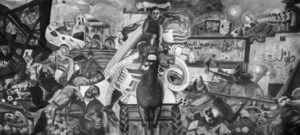When once for my fellowmeI shed a drop of tear, The hale of a thousand suns Arises in my soul When once for my fellowmen I expend a hearty smile, A full –blown moon of purest ray Forever floods my heart But all these days I knew it not, This ineffable Joy; And brooding over that heavy loss I weep and sob again – The Epic of the 20th Century
15 October 2020: Renowned Malayalam poet and Jnanpith laureate Akkitham Achuthan Namboothiri (widely known as Akkitham) left this world today. Akkitham belonged to a tradition of great humanist-poets, leaving behind a splendid legacy in Malayalam literature. His demise came just a few days after the Jnanpith award was formally conferred on him at his residence. Akkitham has been a poet with a penchant for writing poems embedded in socio-cultural levee that transcend time and space. Still many misunderstood him—having gone haywire—in a challenging politico-cultural milieu of the country. Akkitham was pained to know that his name was being dragged into many unsolicited ‘circles and squares.’
Even as his spiritual-humanist journey has been manifest through his poems, the works he penned remain ‘classic’ exemplars of material and metaphysical experiences. Once he said: I do not look into the protocol of precedence. To my mind both physical and metaphysical exist in a beautifully meshed co-existential state. How beautiful is the distant horizon? But it is always at a distance. Happiness is merely a process of erasing sadness. There is only one remedy for pain and sadness – and that remedy is ‘Love.’
Born in a village in Palakkad in 1926, Akkitham found a niche for himself as a poet, essayist, editor, script writer etc. Influenced deeply by the tempo of social reform movement led by V.T. Bhattathirippad and his associated activities, Akkitham’s literary works shot into limelight in the early 1950s. Many would acknowledge that his Irupatham Noottandinte Ithihasam (Epic of the 20th Century) set in motion the wave of modernism in Malayalam poetry. The poem ends thus:
Out of steel that makes guns and swords May we make tractors and ploughs, And with the mighty atomic power Wasted now to make those bombs May we light the lamps of love Along the dark blind village streets. Hail holy light, that issues forth From the egg of invincible love: Hail to you, Oh dove of peace May your wing-beats for ever rise
Akkitham was a prolific writer who brought out several poems, plays, short-stories and essays over decades. Balidarsanam, Arangettam, Desasevika Nimisha Kshetram, Idinju Polinja Lokam, Amritaghatika, Akkithattinte Teranjedutta Kavitakal, and Kalikkottilil. Upanayanam and Samavarttanam are some of the most important works of Akkitham. Balidarsanam won the Kendra Sahitya Akademi Award in 1973. Akkitham himself considered the translation of the Srimad Bhagavatam as his most treasured work. C.R. Das’ Saagar Sangeeth was also translated into Malayalam. The notable achievements of Akkitham included his open support for reforms among the Namboothiri community, promotion of Vedic studies among non-Brahmins, fight against untouchability etc. In fact, he started his career as a journalist working with Unninambudiri, and later worked in Mangalodayam and Yogakshemam. In 1956 Akkitham took up a job in All India Radio (AIR) which he held until 1975. Vayalum Veedum (Paddy field and Home) programme became very popular during his stint in AIR in Thrissur.
Before the Jnanpith, Akkitham was a recipient of Kendra Sahitya Akademi Award, Aasan Prize, Vallathol Award, Lalitambika Sahitya Award, Kerala Sahitya Akademi Award, Odakkuzhal Award, KrishnaGeedhi Award, Vayalar Award, Nalappad Award, Ezhuthachan Award and the Moorti Devi Award of Jnanpith Award Committee. He was the sixth writer to bring Jnanpith Award to Malayalam literature in November 2019.
Love, peace, tears and sorrows are the recurring themes in his poems. Literacy critic M. Leelavathi called his poetic ingenuity as a “marble made of congealed tears.” Tears constitute the main ingredient of his poems, and many of them are rich in symbolism, and have a persuasively philosophical-humanist grain. Another critic R. Viswanathan observed that Akkitham was one who wrote an epic on the failure of revolution. Humanism was not a mere principle for him; rather it remained the very aesthetic of his craft. His poems truly reflect a defence of integral human selfhood and an attempt to humanize the world. That would have led him say, “I like to hear you call me a Gandhian.”
[The author is Director, Inter University Centre for Social Science Research and Extension (IUCSSRE), Mahatma Gandhi University, Kerala. Article courtesy: Global South Colloquy, a nonprofit independent digital social platform of the Institute for Global South Studies and Research.]




